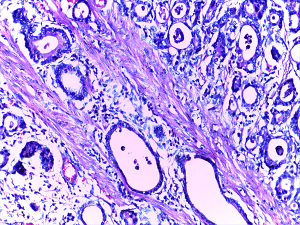First-line Immunotherapy for Stomach Cancer
The FDA has approved pembrolizumab for the first-line treatment of certain HER2-negative gastric and gastroesophageal junction cancers.
The U.S. Food and Drug Administration (FDA) has approved pembrolizumab (Keytruda), in combination with a chemotherapy regimen containing fluoropyrimidine and platinum, for the first-line treatment of locally advanced unresectable or metastatic gastric or gastroesophageal junction (GEJ) adenocarcinoma that does not overexpress HER2.
Pembrolizumab is a type of immunotherapy called an immune checkpoint inhibitor. It blocks a receptor called PD-1 that functions as part of the “brake” system that prevents immune cells from becoming too active. Many cancers exploit this brake system to protect themselves from the immune system, but pembrolizumab can override the brakes and help immune cells fight the tumor.

In 2021, pembrolizumab was approved in combination with the HER2-targeted therapy trastuzumab (Herceptin) and chemotherapy for the treatment of gastric or GEJ cancer that overexpresses HER2. The current approval makes pembrolizumab available to patients whose gastric or GEJ tumors do not overexpress HER2, referred to as HER2-negative tumors.
This approval was based on results from KEYNOTE-859, a multicenter, randomized, double-blind, placebo-controlled, phase III clinical trial conducted in patients with HER2-negative gastric or GEJ cancer who had not received previous systemic therapy for metastatic disease. The 1,579 patients were treated with either cisplatin plus 5-fluorouracil or oxaliplatin plus capecitabine (Xeloda) and were randomly assigned (1:1) to additionally receive placebo or pembrolizumab.
Patients treated in the pembrolizumab arm had a median overall survival of 12.9 months and a median progression-free survival of 6.9 months, compared with 11.5 months and 5.6 months in the placebo arm, respectively. The overall response rate was 51% in the pembrolizumab arm and 42% in the placebo arm.
Gastric cancer is a cancer of the cells that line the inside of the stomach. When the cancer occurs in cells that form the junction between the stomach and the esophagus, it is called GEJ cancer. According to federal statistics, it was estimated that 26,500 individuals would be diagnosed with gastric cancer and 11,130 patients would die of the disease in the United States in 2023.
The FDA rendered its decision on November 16, 2023.